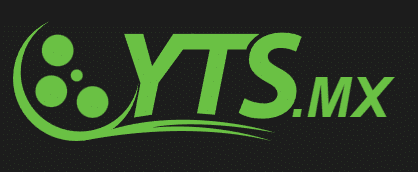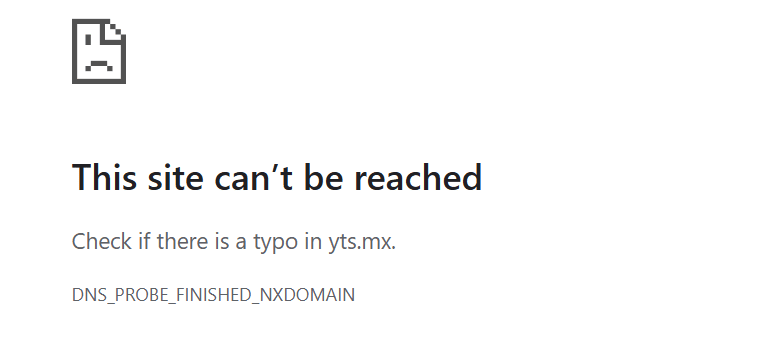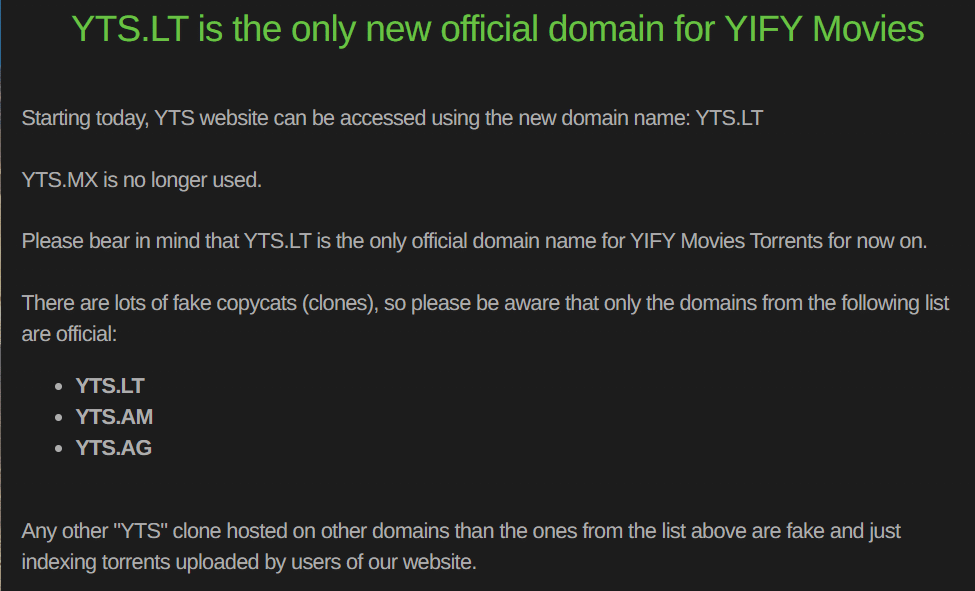After five years of operating in relatively stable waters, popular torrent site YTS is on the move again. The site’s Mexican domain name, YTS.mx, suddenly stopped resolving yesterday and has effectively vanished. While the official reason remains unclear, the YTS operators decided to return to one of their previous homes, YTS.lt.
From: TF, for the latest news on copyright battles, piracy and more.
 With millions of regular users, YTS is arguably the most visited torrent site on the internet today.
With millions of regular users, YTS is arguably the most visited torrent site on the internet today.
The current operators ‘unofficially’ took over the YTS brand in 2015 after the original group threw in the towel. Since then, it has amassed a rather impressive user base.
After adopting one of the most iconic piracy brands, YTS faced its fair share of legal troubles. In 2019, the popular torrent site and its operator were accused of mass copyright infringement in multiple lawsuits filed by filmmakers in the United States. Surprisingly, YTS managed to settle these lawsuits to live another day, although that came at a price.
YTS also dealt with various domain name challenges. When the site first entered the scene, it was operating from the YTS.ag domain name, which it traded in for YTS.am a few years later. In 2019, the torrent site moved to YTS.lt, which it swapped for the YTS.mx domain in 2020.
YTS.mx = Gone
Over the past five years, the Mexican ccTLD proved to be a rather stable domain option, but that didn’t last.
Visitors to YTS yesterday became aware that the YTS.mx domain had stopped resolving. Many simply assumed that the site had issues due to the global Cloudflare outage but hours after Cloudflare’s troubles had been resolved, YTS.mx remained unreachable.
This was not a simple domain suspension either, as the domain’s nameservers appear to have completely vanished.
NXDOMAIN
In fact, according to the Mexican domain name registry, YTS.mx no longer exists. This is highly unusual since the domain was prepaid through 2028. Clearly, an external intervention forced the action.
YTS Relocates to .LT
Initially, the YTS team remained quiet, but through various official communication channels, they eventually confirmed that something was up. While the operators don’t explain what the problem was, they note that the site has relocated to YTS.lt.
“Please use https://yts.lt (YTS.LT) for now to access our site. We’re working on some updates, and this domain will be the best way to stay connected. Stay tuned for more info!,” they note.
YTS Update
As we were writing this article, the official YTS Status site was also updated. All mentions of the .mx domain name have been removed in what appears to be more than a temporary update.
Indeed, in an edited blog post on YTS.lt, the team now confirms that YTS.MX is no longer used.
Domain update
Legal Pressure?
While it is apparent that the .MX domain name issues are serious, it is not immediately clear what caused them. TorrentFreak asked Registry .MX for a comment on the situation, but the organization did not immediately respond.
It is possible that third-party pressure by copyright holders may have played a role here. Earlier this year, the U.S. Trade Representative identified YTS.mx as a notorious piracy market. And a few weeks ago, YTS was nominated as a notorious market again by various rightsholders.
For now, all we know for sure is that YTS.mx is gone. If more information becomes available, we will update this article accordingly.
From: TF, for the latest news on copyright battles, piracy and more.
 Wir schauen uns Qualcomms neue Notebook-CPU genau an. Einige Designentscheidungen sind ungewöhnlich, ein Feature erinnert an George Orwell. Ein Bericht von Johannes Hiltscher (
Wir schauen uns Qualcomms neue Notebook-CPU genau an. Einige Designentscheidungen sind ungewöhnlich, ein Feature erinnert an George Orwell. Ein Bericht von Johannes Hiltscher ( Der Deckenheizstrahler von Kesser eignet sich für überdachte Außenbereiche und ist im frühen Black-Friday-Deal um fast 40 Euro reduziert. (
Der Deckenheizstrahler von Kesser eignet sich für überdachte Außenbereiche und ist im frühen Black-Friday-Deal um fast 40 Euro reduziert. ( With millions of regular users, YTS is arguably the
With millions of regular users, YTS is arguably the 


 Deutschland entwickelt erstmals eine militärische Strategie im Weltraum - mit Wächtersatelliten, Cyberabwehr und 35 Milliarden Euro Budget. (
Deutschland entwickelt erstmals eine militärische Strategie im Weltraum - mit Wächtersatelliten, Cyberabwehr und 35 Milliarden Euro Budget. (